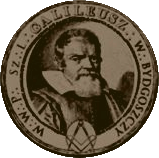Freemasonry during the Commonwealth (up to 1795)
History of Freemasonry in Poland dates back to the eighteenth century and is associated with the Lodge of La Confrerie Rouge (the Red Brotherhood), in which the lights were lit in 1721. The Lodge bring together representatives of the nobility and gentry, and was associated with the traditionalist English lodges. It included, among others, Michael Czartoryski, the Grand Chancellor of the Lithuania and John George Przebendowski, the Treasurer of the Crown (who came from Royal Prussia and was educated in Gdansk). Although bound by the traditions of the English Freemasonry, the lodge La Confrerie Rouge initiated men and women alike.
Soon after, another lodge, under the name Society of Three Brothers, began its work in Warsaw. In Lviv - a Temple of the Three Goddesses was installed. In Gdansk, Lodge of the Three Thunder was erected in 1751.
In 1781, the majority of Polish Masonic lodges became part of the Grand Lodge of the Grand Orient of the Polish Kingdom and the Grand Duchy of Lithuania, working according to Rite of the Rose Cross. Grand Lodge survived the collapse of the Polish state (1795) and continued working up to the act of Alexander I (25th September 1821), which closed all the Masonic lodges. The first Great Master, Roman Ignacy Potocki (1750-1809), was one of the authors of the Constitution Third of May, the enemy of the Confederation Targowica and one of the leaders of the Kosciuszko Insurrection. The last King of Poland, Stanisław August Poniatowski was also of a Freemason.
Masonic movement in Poland was rapidly gaining in importance, largely because lodge members were taken mainly from people of the highest social classes and enjoying the many qualities of mind. In the years of the famous Four Year Paliament, about 20% of the MPs were members of Freemasonry. Freemasons took an active part in the work on the creation of the Constitution of the Third of May.
After the Fall of the Independence (1795-1919)
After the loss of the Independence, the Masonic movement took up work on behalf of its recovery. Masons also worked organically by the means of Positivism. They supported the development of education and raise the level of civilization in Poland. These days, the traditiona link between Freemasonry and Warsaw University was established (almost 60% of professors, including the Rector, belonged to the Brotherhood). In 1821, around 34 lodges were working openly. However, finally the Partitioners of Poland banned the Freemasonry.
Freemasonry between two Great Wars
After the WW1 and the Treaty of Versailles, Poland regained full independence. There was a reactivation of the official work of Freemasonry workshops. It is worth noting that the very first president of the Republic, Gabriel Narutowicz was a Freemason. The Chief of State, Marshal Jozef Pilsudski also sympathized with Freemasonry (although it was not initialized). After the death of the Marshal and on the basis of social tensions a period of intense anti-masonic campaign has begun. In autumn 1938 years president Moscicki signed a decree dismissing all masonic associations (with a great applause from Catholic Church). Polish Freemasonry experienced a profound crisis - only a few workshops remained, acting in secret.
Freemasonry during and after World War II
Masonic movement was persecuted by the Nazi occupiers. Many freemasons were killed or at least hunted. After World War Masonic movement was again "on trial". Stalinist regime denounced every manifestation of independent thinking - and therefore the power of the Masons seemed a natural element of sowing unrest and intellectual ferment. The nascent opposition, mainly based in working class, was heavily influenced by Catholic Church and this did not fit into the ethos of Freemasonry. The intellectual opposition was also very closely associated with the circles of the church hierarchy. Therefore, freemasonry in Poland during the years 1939-89 is almost inexistent.
Freemasonry in Poland - today
Masonic ideas begins to return only after the June 1989 elections and the change of regime. In the early 90's, three major Polish Grand Lodges were constituted:
- Grand Orient of Poland (mother lodge for Galileo Galilei Lodge and Masonic Triangle Johannes and Elisabeth Hevelius)
- Grand National Lodge of Poland
- The International Order of Freemasonry Le Droit Humain
- Gabriel Narutowicz Lodge (Kraków)
- Ignacy Paderewski Lodge (Poznań)
- Gaia Aeterna GFLF (Warszawa)
- Prometea GFLF (Warszawa)

